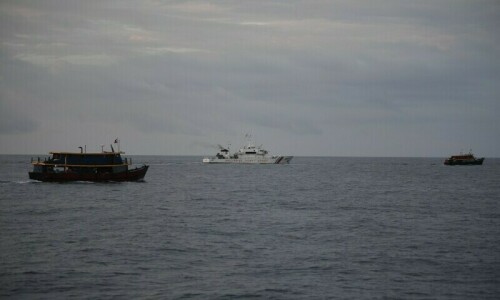
Being a lower riparian state, Pakistan’s water dispute started just after its independence. Since then, its concerns in this regard are growing because India is not only controlling the water flow of rivers but is also working on 17 power projects on River Chenab and 16 projects on River Jhelum.
India also plans to assist Afghanistan in constructing multi-purpose water projects on the tributaries of the Kabul River. Afghanistan is planning for construction of dams and facilities on its rivers for flood control, electricity generation and irrigation expansion.
Once implemented, such projects would impact the amount of water and timing of peak runoff for Iran, Pakistan, Uzbekistan and Turkmenistan.
Afghanistan’s initiative for construction multi-purpose water projects on the tributaries of Kabul River with a total water storage capacity of 4.7 million acre feet (MAF), 25 per cent more than that of Mangla Dam, would adversely impact Pakistan.
It is estimated to suffer 16 to 17 per cent drop in water supply from Afghanistan after construction of 13 dams on the Kabul River.
About 17 million acre-feet water enters Pakistan through the Kabul River every year. Currently, Afghanistan irrigates 12,000 acres with water from the Kabul River. If Afghan government goes ahead with its hydroelectric project on the river and the Kama irrigation project, it would be able to irrigate another 14,000 acres, using another 0.5 MAF of water.
The basin covers 53,000 km2 within Afghanistan and 14,000 km2 within Pakistan before the confluence with the Indus River.
The basin has numerous small rivers and seasonal streams. The river basin supports over 300,000 ha of intensively irrigated areas and high valued agricultural crops, including over 50,000 ha within Pakistan.
In Pakistan the first head works on Kabul River is the Warsak Dam. From this point, various canals are developed to irrigate Peshawar Valley. These canals have significantly contributed towards the prosperity of Charsadda district. Bara River flowing in from the Khyber Agency in the southwest is the first tributary to the Kabul River in Pakistan. Another and a major contributor to the Kabul River is the Swat River. It rises in the northern Swat near the city of Kalam and after traveling southward for about 70 miles gets joined by the Panjkora River near the town of Kalan Gai in Malakand District.
The Panjkora River itself, just like Swat River, rises near Shiren gai in Dir and travels south to meet its counterpart. Together these two rivers continue to travel southward as Swat River and after passing through the Mahmond Agency fall into the Kabul River near Charsadda.
The Afghans argue that water demand for Kabul City and within the river basin is expected to increase in the future, and Pakistan has significantly increased its water use of the Indus River for power, municipal and agriculture over the last 30 years.
According to a report on “Trans-boundary Water Policy of Afghanistan,” the country uses only a small portion (about 30 per cent) of the water that originates in the country. The primary source of water is snow melt in the Hindu Kush Mountains with runoff peaking in early summer. Afghanistan lacks sufficient dams, reservoirs and flow control structures to adequately manage and control this runoff. As a result, the country is susceptible to both severe flooding and droughts, and has little control of water flow into neighbouring countries.
For this, four hydropower projects will be constructed in Punjshir sub-basin. These include (a) the $332 million Totumdara project to generate 200 MW of electricity and create water storage capacity of 3,32,510 acres feet; (b)the $1.174 billion Barak project to generate 100 MW of electricity and store 4,29,830 acres feet of water; (c)$1.078 billion Punjshir (100 MW) project with a capacity to store 10,54,300 acres feet of water; and (d) the $607 million Baghdara (210 MW) project with a capacity 3,24,400 acres feet of water.
In the Logur Upper Kabul sub-basin on the Kabul River four more dams are to be built which include the $72 million Haijana project (72 MW) with water storage capacity of 1,78,420 acres feet; $207 million Kajab (15 MW) project with water storage capacity of 3,24,400 acres feet; the $356 million Tangi Wadag (56 MW) project (2,83,850 acres feet); and $51m Gat (86 MW) project ( 4,05,500 acres feet).
Another four more dams will be built in the Lower Kabul sub-basin, including the $442 million Sarobi project (210 MW) with the capacity to store 3,24,400 acres feet of water; the $1.434 billion Laghman project (1251 MW) with water storage capacity of 233568 acres feet; and the $1.094 billion Konar (A) (94.8 MW) and Kama projects (11.5 MW).
Pakistan is one of the most water-stressed countries, a situation likely to worsen into outright water scarcity owing to high population growth. There is no additional water that can be injected into the system. Pakistan’s is dependent on a single river system and lacks the robustness that many countries enjoy by virtue of having a multiplicity of river basins and diversity of water resources.
Even, under the Indus Water Treaty, Pakistan is supposed to receive 55,000 cusecs of water, but authorities complain that its share was drastically reduced, causing damage to crops. Now it only received around 13,000 cusecs during the winter and a maximum of 29,000 cusecs during the summer. This averages around 22,000-25,000 cusecs - less than half of its share. For a country whose water availability per capita has plummeted by 78.4 per cent over the past six decades, its policymakers need to plan actively to avoid threats to food security and severe power shortage.
Unfortunately, there is no water sharing agreement between Afghanistan and Pakistan. Except for an agreement on the Helmand River, no treaties exist between Afghanistan and its neighbours on water sharing.
In the past, Pakistan did try to bring Afghanistan to the negotiating table to work out some mechanism to ensure a win-win situation for both sides. The World Bank agreed to facilitate a bilateral water treaty but refused to become the guarantor as it is the guarantor of the Indus Waters Treaty. The Afghan administration, however, excused itself by saying it was working on its own national water policy and it was not possible to initiate talks until that policy is ready.
The prime minister of Pakistan has already established Pakistan Transborder Water Organisation (PTWO) to tackle issues arising from construction of dams and water sector projects by upper riparian countries. Now, to highlight the issue and concerns pertaining to Kabul river projects, experts are trying to estimate the expected loss to the irrigation system in case the Afghan government builds dams on the Kabul River.
The two states can establish a joint, multi-disciplinary, scientific fact-finding working group to build a mutually agreed hydrological knowledge base on the Kabul River basin; or set up a bilateral Afghanistan-Pakistan water resources commission to negotiate hydro-power and agricultural development plans. Both the countries can negotiate a bilateral treaty on the use and management of the Kabul River’s water resources for their mutual benefit.














































Dear visitor, the comments section is undergoing an overhaul and will return soon.